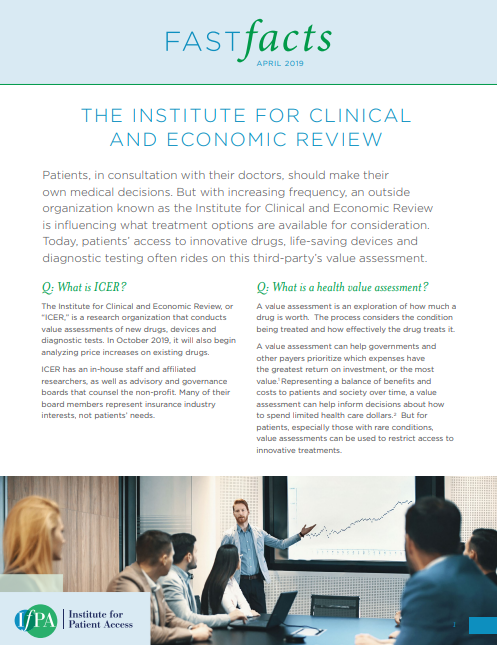New “Fast Facts” Scrutinizes ICER
April 9, 2019
Policymakers, providers and patients all feel the impact of The Institute for Clinical and Economic Review, whose ubiquitous cost-effectiveness reports can determine patients’ access to medicine. But could these stakeholders and the public find real answers to basic questions – like “What is ICER?” and “Who controls ICER?”
Not until now.
A newly released “Fast Facts” from the Institute for Patient Access answers these and other important questions about the organization from the perspective of patient access. Topics include:
The Connection between ICER and the Insurance Industry
The paper outlines the heavy influence of the insurance industry on ICER. Many of ICER’s researchers and board members represent insurance industry interests. And the organization receives considerable funding from health insurance companies and their foundations. Despite claiming to be “free of conflict,” ICER routinely issues findings that provide fodder for health insurers to grow profits by restricting patients’ access to medicine.
ICER’s Repeated Failure to Incorporate Patient Feedback
While ICER welcomes written feedback from patients and providers, ICER doesn’t “adequately integrate” this input into its analysis, the “Fast Facts” explains.
Patients, providers and advocacy groups are specifically concerned about ICER’s lack of consideration of the “intangible benefits of good health.” These quality-of-life factors “like being physically able to perform an activity or attend a function” may be hard to quantify, but for patients with chronic conditions, they make life worth living.
ICER’s Lack of Complete Data
Also missing from ICER’s analysis? Complete data, according to the “Fast Facts.”
“ICER doesn’t always wait for all relevant data,” it reads. ICER may instead use incomplete evidence and qualitative ‘judgement.’ In some instances, the paper points out, ICER has evaluated a drug’s cost effectiveness ahead of it or its price becoming publicly available.
Making “value-based” price determinations without all the relevant facts can impede patients’ ability to access medication. The “Fast Facts” includes examples of how CVS Caremark and New York Medicaid have both used ICER’s findings in price negations and coverage decisions that reduced access for patients.
What good are novel treatments if patients can’t access them? For patients who may be impacted by ICER’s work, and for the providers who treat them, the “Fast Facts” casts new light on the organization that’s affecting patients’ ability to use breakthrough drugs, devices and diagnostic tests.
To learn more read, “Fast Facts: The Institute for Clinical and Economic Review.”
Categorized in: Blog


